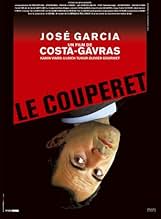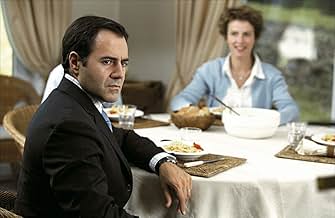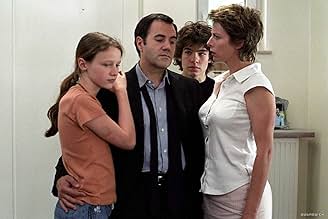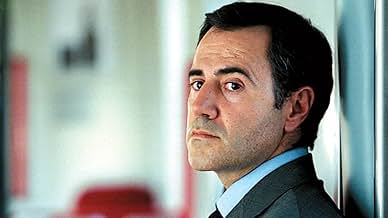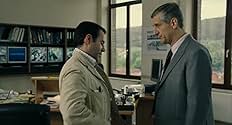IMDb-BEWERTUNG
7,3/10
8729
IHRE BEWERTUNG
Ein Chemiker (Garcia) verliert seinen Job durch Outsourcing. Zwei Jahre später und immer noch arbeitslos, findet er eine Lösung: Er will seine Konkurrenz wirklich ausschalten.Ein Chemiker (Garcia) verliert seinen Job durch Outsourcing. Zwei Jahre später und immer noch arbeitslos, findet er eine Lösung: Er will seine Konkurrenz wirklich ausschalten.Ein Chemiker (Garcia) verliert seinen Job durch Outsourcing. Zwei Jahre später und immer noch arbeitslos, findet er eine Lösung: Er will seine Konkurrenz wirklich ausschalten.
- Regie
- Drehbuch
- Hauptbesetzung
- Auszeichnungen
- 1 Gewinn & 5 Nominierungen insgesamt
Geordy Couturiau
- Maxime Davert
- (as Geordy Monfils)
Dieudonné Kabongo
- Quinlan Longus
- (as Dieudonné Kabongo Bashila)
Empfohlene Bewertungen
The thirty-nine years old executive Bruno Davert (José Garcia) has been working for fifteen years in a paper company. After a merging operation with a Romania's company, he is fired in a downsizing. While unemployed for two years, Bruno loses his self-esteem and sanity and his family loses the middle-class lifestyle without cable television, Internet and regular consumption. He concludes that there is too much competition in his sector for a few job positions and decides to literally eliminate his competitors, killing those more qualified than him.
"Le Couperet" is a sarcastic view of the greed of the companies and the effects of downsizing in the self-esteem and sanity of a man. The awareness of the economical situation in France (but could be in most of the nations) and black-humor of Costas-Gravas gives a fantastic satire to the greed of the corporations, aiming exclusively profits without any care for the human beings. The sub-employment, as means of survival; the exacerbated use of merchandising to force the consumption; the situation of the family, being emotionally shattered with the stressful situation of the husband and father; all of these elements are ironically presented in this tough and realistic social satire through a French middle-class family. José Garcia is stunning in the role of a bitter man fighting to find job position and serial killer. My vote is eight.
Title (Brazil): "O Corte" ("The Cut")
"Le Couperet" is a sarcastic view of the greed of the companies and the effects of downsizing in the self-esteem and sanity of a man. The awareness of the economical situation in France (but could be in most of the nations) and black-humor of Costas-Gravas gives a fantastic satire to the greed of the corporations, aiming exclusively profits without any care for the human beings. The sub-employment, as means of survival; the exacerbated use of merchandising to force the consumption; the situation of the family, being emotionally shattered with the stressful situation of the husband and father; all of these elements are ironically presented in this tough and realistic social satire through a French middle-class family. José Garcia is stunning in the role of a bitter man fighting to find job position and serial killer. My vote is eight.
Title (Brazil): "O Corte" ("The Cut")
People who characterize this film as a comedy obviously haven't got it. The comic element is just a thin surface. This is a tragic story and a very strong political statement. Obviously Bruno's decisions and actions are absurd, but his circumstances are not. The movie offers an incisive look at the dark reality of chronic unemployment. Corporate greed leads to story after story after story of desperation. Westlake and Gavras know that in order to pass the message you have to lighten up the atmosphere (a la Truman Show), or else the viewer won't sit the whole movie. In order to appreciate the film you have to marginalize the main plot element (the murder story) and concentrate on all the subplots.
Maybe the best 'noir' movie I've seen in the last years, and definitively the best Donald Westlake adaptation so far, "Arcadia" is the story of a man obsessed with a job, who thinks that the only way to get it is killing every candidate who can be better than him, and must cope with his many mistakes and family problems. It sounds like a tragedy, or a drama, but it is the best piece of black (or not so black) humor combined with noir I remember, which is surprising: I didn't know that Costa-Gavras had so much sense of humor. There are many symbols, allegories, but above it all, it mentions every controversial and denounce topic in existence for just one, two or three minutes, just to mention it. The result is, incredibly and amazingly, funny, intellectually engaging, extremely suspenseful (the results of every situation and, at last, the end of the movie are unpredictable) and a master class of narrative progression, at least until the last 20 minutes, where the movie drags. But until then it is a flawless masterpiece, and it deserves to be watched over and over again. José García is another surprise, a very good comedian.
Costa Gavras is a master of the political film. Political films in general are not my cup of tea. They try to convey some kind of message to the public, and they do it by portraying the persons in a stylized way, losing in depth in the process. People are portrayed realistically but their conflicts are simplified because the political film intends to portray society and its problems - unemployment, hunger, class exploitation and so on - in other words, they talk about the big (lack of bread, for instance) and forget the small (emotions like loneliness and sadness, for instance).
Many political films concerned about their objectivity are quite emotionless, or else their emotions are one-sided - bad and ugly live here, beauty and love live there, or the other way around.
FEW POLITICAL FILMS are able to bridge this gap: to talk about society and at the same time not forget the individual man and his/her very complex universe and contradictions. SOME OF THESE FILMS ARE the masterpieces of neorealism: "Ladri di Bicicletta" and "Umberto D" by Vittorio de Sica, "Los Olvidados" by Buñuel and many others.
Costa Gavras doesn't reach this goal. His films are efficient and convey their message to the public, but they lack warmth.
"Le Couperet" is nonetheless an interesting film - a man that works as a chemist loses his job and after 2 years of unemployment decides to kill whoever stands in his way to get another job - so he places an ad of an imaginary enterprise in the newspaper offering a chemist job (his professional area) and rents a post box to read the answers he gets. He reads all the résumés and proceeds to kill all the people that are equal or more qualified than him - so that in the end he'll get the job because he will be the only remaining choice. All the while he will go on living normally with his family. He will suffer emotional crises, his marriage will become strained but no one will suspect anything at all of his alternative activities.
The film, after all, is very entertaining and gives a sad picture of France (and Western Europe I would say), suffering economic crisis and rising doubts. Is it possible with the globalization to maintain a very expensive Social Welfare and have to face a growing economic erosion? In USA (as far as I know), for instance, some unemployed people live on the streets or under the bridges. In France and Western Europe, unemployed people are still taken care of. Till when? Many enterprises are closing or cutting expenses (that means firing people).
Costas Gavras films are good because they make questions about the world in which we live, they make us think, but his films don't really touch me - I would say they provide food for thought but not food for the heart.
Many political films concerned about their objectivity are quite emotionless, or else their emotions are one-sided - bad and ugly live here, beauty and love live there, or the other way around.
FEW POLITICAL FILMS are able to bridge this gap: to talk about society and at the same time not forget the individual man and his/her very complex universe and contradictions. SOME OF THESE FILMS ARE the masterpieces of neorealism: "Ladri di Bicicletta" and "Umberto D" by Vittorio de Sica, "Los Olvidados" by Buñuel and many others.
Costa Gavras doesn't reach this goal. His films are efficient and convey their message to the public, but they lack warmth.
"Le Couperet" is nonetheless an interesting film - a man that works as a chemist loses his job and after 2 years of unemployment decides to kill whoever stands in his way to get another job - so he places an ad of an imaginary enterprise in the newspaper offering a chemist job (his professional area) and rents a post box to read the answers he gets. He reads all the résumés and proceeds to kill all the people that are equal or more qualified than him - so that in the end he'll get the job because he will be the only remaining choice. All the while he will go on living normally with his family. He will suffer emotional crises, his marriage will become strained but no one will suspect anything at all of his alternative activities.
The film, after all, is very entertaining and gives a sad picture of France (and Western Europe I would say), suffering economic crisis and rising doubts. Is it possible with the globalization to maintain a very expensive Social Welfare and have to face a growing economic erosion? In USA (as far as I know), for instance, some unemployed people live on the streets or under the bridges. In France and Western Europe, unemployed people are still taken care of. Till when? Many enterprises are closing or cutting expenses (that means firing people).
Costas Gavras films are good because they make questions about the world in which we live, they make us think, but his films don't really touch me - I would say they provide food for thought but not food for the heart.
I've seen "Le Couperet" and it impressed me.
There is a lot of suspense.
And influence from Alfred Hitchcock movies.
Costa-Gavras himself came to my country (Brazil) to give a lecture and answered questions about cinema and his movies in March 29, 2005.
He talked about how he started making movies and the French movies.
In his opinion, France is a good place to make movies because the government helps filmmakers and there is at least 150 movies made every year.
In March 31, an avant-premiere of "Le Couperet" took place in Salvador, Bahia, Brazil.
It was great to see this movie having Costa-Gavras present.
Amazing.
There is a lot of suspense.
And influence from Alfred Hitchcock movies.
Costa-Gavras himself came to my country (Brazil) to give a lecture and answered questions about cinema and his movies in March 29, 2005.
He talked about how he started making movies and the French movies.
In his opinion, France is a good place to make movies because the government helps filmmakers and there is at least 150 movies made every year.
In March 31, an avant-premiere of "Le Couperet" took place in Salvador, Bahia, Brazil.
It was great to see this movie having Costa-Gavras present.
Amazing.
Wusstest du schon
- WissenswertesAds on billboards in the background were created by famous Italian photographer Oliviero Toscani, a friend of the director.
- PatzerAt the beginning, when Davert (Garcia) gets out of the shower and then immediately returns to the bathroom to vomit, you can see in the mirror that he is wearing an underwear.
- Zitate
Gérard Hutchinson: [When the interviewer abruptly ends the interview] I said to myself, lucky I didn't have the gun on me.
- VerbindungenReferenced in Elite Squad: Im Sumpf der Korruption (2010)
Top-Auswahl
Melde dich zum Bewerten an und greife auf die Watchlist für personalisierte Empfehlungen zu.
- How long is The Ax?Powered by Alexa
Details
- Erscheinungsdatum
- Herkunftsländer
- Sprachen
- Auch bekannt als
- Jobkiller - Eine mörderische Karriere
- Drehorte
- Produktionsfirmen
- Weitere beteiligte Unternehmen bei IMDbPro anzeigen
Box Office
- Weltweiter Bruttoertrag
- 4.885.946 $
- Laufzeit
- 1 Std. 57 Min.(117 min)
- Farbe
- Sound-Mix
- Seitenverhältnis
- 1.85 : 1
Zu dieser Seite beitragen
Bearbeitung vorschlagen oder fehlenden Inhalt hinzufügen

![Bande-annonce [OV] ansehen](https://m.media-amazon.com/images/M/MV5BMWNjMWQ4ZmItOTVjMi00YzkxLWIzYmYtOWVjNTg3MDRkMzIwXkEyXkFqcGdeQXRyYW5zY29kZS13b3JrZmxvdw@@._V1_QL75_UX500_CR0)
